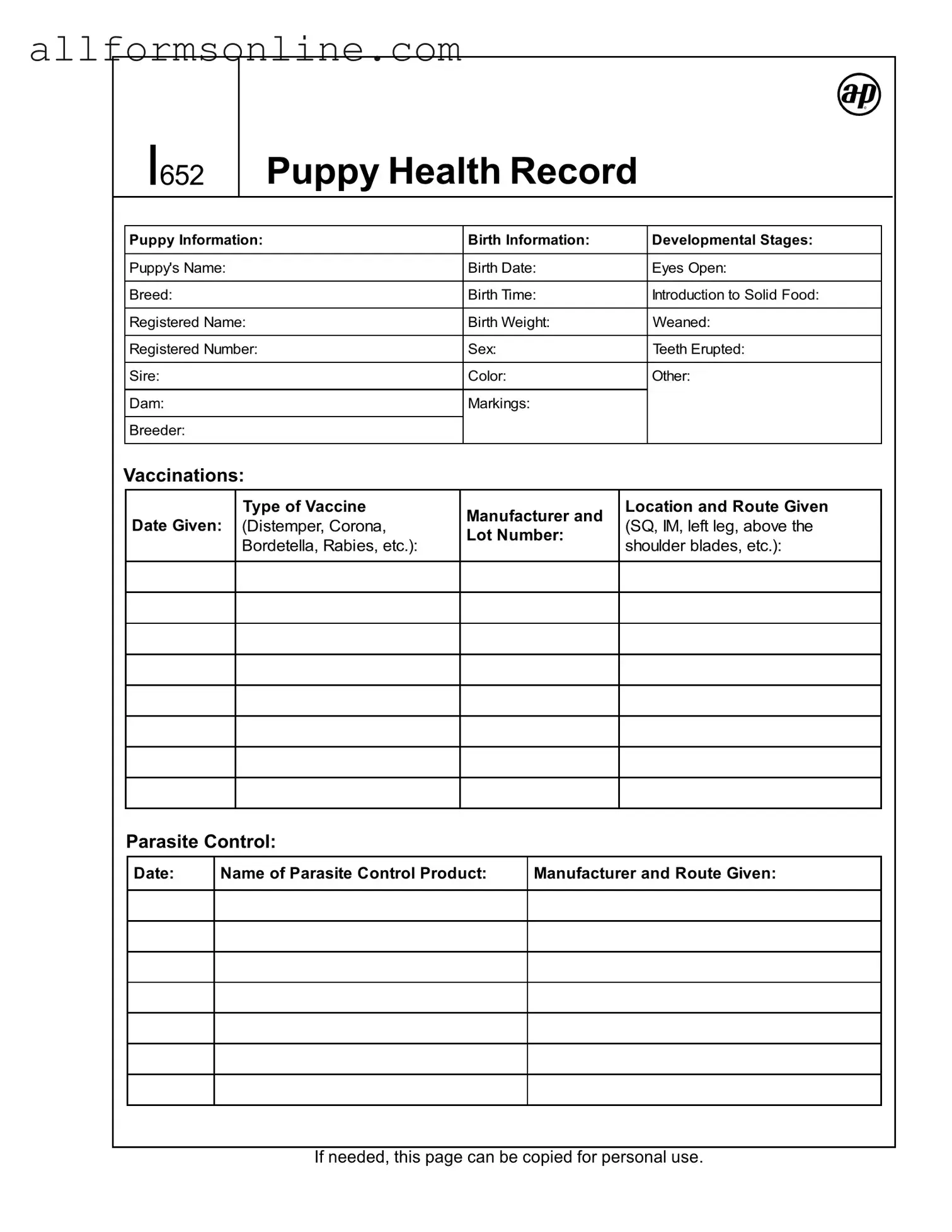Free Puppy Health Record PDF Form
Misconceptions
-
Misconception 1: The Puppy Health Record form is only for vaccinations.
This form serves a broader purpose than just tracking vaccinations. It includes vital information about the puppy's birth details, developmental stages, and various health checks. Owners can also document parasite control and any examinations performed by a veterinarian.
-
Misconception 2: The form is not necessary if the puppy is healthy.
Even if a puppy appears healthy, maintaining a health record is essential. It provides a comprehensive history that can be beneficial for future veterinary visits, ensuring that all medical information is readily available for the veterinarian's review.
-
Misconception 3: Only veterinarians can fill out the form.
While veterinarians play a crucial role in providing medical care, owners can also complete sections of the form. They can document observations, schedule vaccinations, and track developmental milestones. This collaboration helps ensure comprehensive care.
-
Misconception 4: The form is only useful during the puppy's first year.
The Puppy Health Record form is beneficial beyond the first year. It can be used to track ongoing health issues, vaccinations, and any changes in the puppy's health as it matures into adulthood. Keeping this record updated can aid in long-term health management.
What to Know About This Form
What is the purpose of the Puppy Health Record form?
The Puppy Health Record form serves as a comprehensive log for tracking your puppy's health and developmental milestones. It includes vital information such as birth details, vaccinations, and parasite control. Keeping this record helps ensure that your puppy receives appropriate care and vaccinations at the right intervals, which is crucial for their long-term health.
What information do I need to fill out on the form?
You will need to provide various details about your puppy, including their name, breed, birth date, and weight. Additionally, the form requires information about vaccinations, such as the type of vaccine, the date it was given, and the manufacturer's details. This ensures that all health-related events are documented, which can be helpful for future veterinary visits.
How often should vaccinations be given according to the form?
The form suggests that vaccinations should ideally be administered at three-week intervals. This schedule helps to build your puppy's immune system effectively. It’s important to follow this timeline closely to ensure that your puppy is protected against common diseases during their early development stages.
What should I do if my puppy needs deworming?
If your puppy requires deworming, the form provides guidance on when to administer the treatment. It recommends using products like pyrantel pamoate at specific ages, typically starting at two weeks old and continuing at regular intervals. Always consult your veterinarian for the best deworming schedule and product based on your puppy's needs.
Can I make copies of the Puppy Health Record form?
Yes, the form is designed for your convenience, allowing you to make copies for personal use. This is particularly useful if you have multiple puppies or if you want to keep a detailed record for your veterinarian. Having multiple copies can help you stay organized and ensure that all important health information is easily accessible.
Different PDF Forms
I-983 - Non-compliance with the I-983 can jeopardize the student's visa status.
The Hold Harmless Agreement form is a crucial document for anyone looking to safeguard personal interests during activities. It effectively limits liability, ensuring that parties clearly define their roles and responsibilities in various scenarios. To ensure proper understanding and utilization, it is advisable to familiarize oneself with the Hold Harmless Agreement essential guidelines found at the Hold Harmless Agreement form resource.
Workplace Incident Report Sample - This report ultimately assists in creating a safer job environment.
How to Use Puppy Health Record
Completing the Puppy Health Record form is essential for tracking your puppy’s health and development milestones. This form will help ensure that all necessary vaccinations and treatments are documented properly. Follow these steps carefully to fill it out accurately.
- Puppy Information: Start by entering your puppy's name, breed, color, and registered name. Make sure to include the registered number if applicable.
- Birth Information: Fill in the birth date, time, and weight of your puppy. Don’t forget to note if the eyes have opened and if the puppy has been weaned.
- Developmental Stages: Record significant milestones such as when the puppy was introduced to solid food, when teeth erupted, and any markings that distinguish your puppy.
- Vaccinations: For each vaccination, list the date given, type of vaccine (like Distemper or Bordetella), and the manufacturer's lot number. Specify the location and route the vaccine was administered.
- Parasite Control: Document the date and name of the parasite control product used, along with the manufacturer's details and the route given.
- Examinations or Procedures: Note the date of any examinations or procedures performed by you or a veterinarian. Include findings and comments, as well as the initials of the person conducting the examination.
- Schedule of Events: Keep track of significant events from birth to spay or neuter, including deworming and vaccinations. This helps maintain a comprehensive health history.
Once you have filled out the form, keep it in a safe place. Regular updates will ensure that your puppy's health records are current and complete, making it easier to manage their healthcare needs.
